Making a Difference & Improving Lives
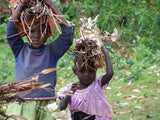 Our aim is to buy high quality, ethically sourced and environmentally friendly products from disadvantaged producers from across the developing world in order to help people trade out of poverty.
Our aim is to buy high quality, ethically sourced and environmentally friendly products from disadvantaged producers from across the developing world in order to help people trade out of poverty.
We are a relatively small family run business that looks to work with individual artisans, co-operatives and small businesses across the developing world. Tilnar Art is proud to be a member of BAFTS, the British Association for Fair Trade Shops and Suppliers.
Buying Policy
 Tilnar Art predominantly buys from primary producers. We make advance payments for materials, to help our suppliers buy raw materials and this ensures that producers do not have to take on debts in order to complete our orders. We try to order regularly from each producer to maintain continuity of demand and we pay for all orders once the goods are ready in their countries of origin.
Tilnar Art predominantly buys from primary producers. We make advance payments for materials, to help our suppliers buy raw materials and this ensures that producers do not have to take on debts in order to complete our orders. We try to order regularly from each producer to maintain continuity of demand and we pay for all orders once the goods are ready in their countries of origin.
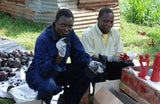 We either visit our suppliers personally or ensure that our agents in each country make regular inspections to check that Fair Trade standards are adhered to. We also encourage our suppliers to join national and international Fair Trade bodies. In addition each supplier is asked to complete a comprehensive Fair Trade questionnaire.
We either visit our suppliers personally or ensure that our agents in each country make regular inspections to check that Fair Trade standards are adhered to. We also encourage our suppliers to join national and international Fair Trade bodies. In addition each supplier is asked to complete a comprehensive Fair Trade questionnaire.
All our suppliers ensure that their workers are paid a fair price per piece, and we strive to make sure that men and women are paid the same rate. We aim to ensure that no children under the age of 16 are involved in production of our products. Many of our items, particularly from Zimbabwe and South Africa, are produced by home workers which provides useful additional income whilst allowing them to look after their homes and families.
Buying Policy In Zimbabwe
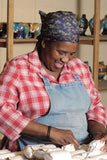
Tilnar Art aims to help provide stable employment and basic needs for many dependants in Zimbabwe during a time when unemployment and inflation are at unimaginable levels. Our artists either work for themselves or work in co-operatives. We ensure that we pay a fair price for all our products and our fair buying policy can be seen by the fact that our family run supplier has worked with the same artists for over 15 years.
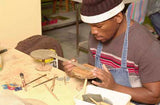 The items are purchased direct from the artists, thereby supporting the indigenous tribes of Zimbabwe. We can confirm that no money is paid to the Government and the money goes to our family run supplier who pays the artists. Indeed more often than not our supplier is advancing money to the artists to help them support their families before products are even made. We believe that it is now more important than ever to support these artists during these very difficult times as the ability of these artists to support their families depends on our purchases. We believe that we should not turn our back on individual artists due to the human rights abuses of a government as to do so condemns them to even greater hardship.
The items are purchased direct from the artists, thereby supporting the indigenous tribes of Zimbabwe. We can confirm that no money is paid to the Government and the money goes to our family run supplier who pays the artists. Indeed more often than not our supplier is advancing money to the artists to help them support their families before products are even made. We believe that it is now more important than ever to support these artists during these very difficult times as the ability of these artists to support their families depends on our purchases. We believe that we should not turn our back on individual artists due to the human rights abuses of a government as to do so condemns them to even greater hardship.
Environmental Policy
Tilnar Art seeks to minimise our impact on the environment. All our items are handmade so no machinery or energy is used in the making of our products. We do not air freight any of our products and transport all of our products by sea to reduce the carbon footprint of our products.
Sustainable Wooden Products
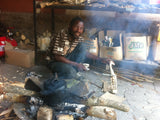 We try and ensure that all of our wood products are sourced from sustainable sources and from a non-rainforest region of the world.
We try and ensure that all of our wood products are sourced from sustainable sources and from a non-rainforest region of the world.
All of our wood products are primarily sourced from Jacaranda or Olive wood. Olive wood has a very quick planting to maturity cycle and is grown and regularly replanted for its fruit. Jacaranda is a non-indigenous invasive species from South America that is considered a weed in Africa. It is now illegal to plant Jacaranda trees in South Africa due to its invasive qualities and the damage it causes to other vegetation.
Re-Used/Recycled Products
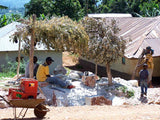
We source a large part of our range from recycled, natural or re-used materials to be as environmentally positive as possible. This can be seen in our ranges of Meg Hawkins & Azeti Recycled Aluminium Collections, Recycled Metal Sculptures, Recycled Tin Animals and Recycled Bottle Top items. We also encourage suppliers to source raw materials locally, to use natural substances and to use recycled packaging wherever possible.
The exciting new development for Tilnar Art is the way the consumer is becoming increasingly aware of the environmental impact of their products. It feels like the consumer is finally ‘catching up’ with Tilnar Art and we will really be promoting the environmental zero plastic qualities of our products. In particular, our Recycled Aluminium Collections and our Soapstone Collections which have less than 1% environmental impact when compared to plastic or resin products. We will be introducing new Soapstone Point of Sale and swing tags to promote this. #ThinkNo2Plastic #ThinkHandmade #BuySoapstone
Re-Used Cardboard Boxes and Packaging Materials
As well as sourcing our products from sustainable, natural or recycled sources, we also try and reduce our carbon footprint by using recycled packaging materials as much as possible. We operate a cardboard and packaging recycling programme where we re-use packaging and boxes from our local retailers.
10 Principles of Fairtrade
WFTO (The World Fair Trade Organisation) prescribes 10 Principles that Fair Trade Organisations must follow in their day-to-day work and carries out monitoring to ensure these principles are upheld:
Principle One: Creating Opportunities for Economically Disadvantaged Producers
Poverty reduction through trade forms a key part of the organisation’s aims. The organisation supports marginalised small producers, whether these are independent family businesses, or grouped in associations or co-operatives. It seeks to enable them to move from income insecurity and poverty to economic self-sufficiency and ownership. The organisation has a plan of action to carry this out.
Principle Two: Transparency and Accountability
The organisation is transparent in its management and commercial relations. It is accountable to all its stakeholders and respects the sensitivity and confidentiality of commercial information supplied. The organisation finds appropriate, participatory ways to involve employees, members and producers in its decision-making processes. It ensures that relevant information is provided to all its trading partners. The communication channels are good and open at all levels of the supply chain.
Principle Three: Fair Trading Practices
The organisation trades with concern for the social, economic and environmental well-being of marginalised small producers and does not maximise profit at their expense. It is responsible and professional in meeting its commitments in a timely manner. Suppliers respect contracts and deliver products on time and to the desired quality and specifications.
Fair Trade buyers, recognising the financial disadvantages faced by Producers and Suppliers of FT products, ensure orders are paid on receipt of documents or as mutually agreed. For Handicraft FT products, an interest free pre-payment of at least 50 % is made on request. For Food FT products, pre-payment of at least 50% at a reasonable interest is made if requested. Interest rates that the suppliers pay must not be higher than the buyers’ cost of borrowing from third parties. Charging interest is not required.
Where southern Fair Trade suppliers receive a pre-payment from buyers, they ensure that this payment is passed on to the producers or farmers who make or grow their Fair Trade products.
Buyers consult with suppliers before cancelling or rejecting orders. Where orders are cancelled through no fault of producers or suppliers, adequate compensation is guaranteed for work already done. Suppliers and producers consult with buyers if there is a problem with delivery, and ensure compensation is provided when delivered quantities and qualities do not match those invoiced.
The organisation maintains long term relationships based on solidarity, trust and mutual respect that contribute to the promotion and growth of Fair Trade. It maintains effective communication with its trading partners. Parties involved in a trading relationship seek to increase the volume of the trade between them and the value and diversity of their product offer as a means of growing Fair Trade for the producers in order to increase their incomes. The organisation works cooperatively with the other Fair Trade Organisations in country and avoids unfair competition. It avoids duplicating the designs of patterns of other organisations without permission.
Fair Trade recognises, promotes and protects the cultural identity and traditional skills of small producers as reflected in their craft designs, food products and other related services.
Principle Four: Fair Payment
A fair payment is one that has been mutually negotiated and agreed by all through on-going dialogue and participation, which provides fair pay to the producers and can also be sustained by the market, taking into account the principle of equal pay for equal work by women and men. The aim is always the payment of a Local Living Wage. Fair Payment is made up of Fair Prices, Fair Wages and Local Living Wages.
Fair Prices
A Fair Price is freely negotiated through dialogue between the buyer and the seller and is based on transparent price setting. It includes a fair wage and a fair profit. Fair prices represent an equitable share of the final price to each player in the supply chain.
Fair Wages
A Fair Wage is an equitable, freely negotiated and mutually agreed wage, and presumes the payment of at least a Local Living Wage.
Local Living Wage
A Local Living Wage is remuneration received for a standard working week (no more than 48 hours) by a Worker in a particular place, sufficient to afford a decent standard of living for the Worker and her or his family. Elements of a decent standard of living include food, water, housing, education, health care, transport, clothing, and other essential needs, including provision for unexpected events.
Principle Five: Ensuring no Child Labour and Forced Labour
The organisation adheres to the UN Convention on the Rights of the Child, and national / local law on the employment of children. The organisation ensures that there is no forced labour in its workforce and / or members or homeworkers.
Organisations who buy Fair Trade products from producer groups either directly or through intermediaries ensure that no forced labour is used in production and the producer complies with the UN Convention on the Rights of the Child, and national / local law on the employment of children. Any involvement of children in the production of Fair Trade products (including learning a traditional art or craft) is always disclosed and monitored and does not adversely affect the children’s well-being, security, educational requirements and need for play.
Principle Six: Commitment to Non Discrimination, Gender Equity and Women’s Economic Empowerment, and Freedom of Association
The organisation does not discriminate in hiring, remuneration, access to training, promotion, termination or retirement based on race, caste, national origin, religion, disability, gender, sexual orientation, union membership, political affiliation, HIV/AIDS status or age.
The organisation has a clear policy and plan to promote gender equality that ensures that women as well as men have the ability to gain access to the resources that they need to be productive and also the ability to influence the wider policy, regulatory, and institutional environment that shapes their livelihoods and lives. Organisational constitutions and by-laws allow for and enable women to become active members of the organisation in their own right (where it is a membership based organisation), and to take up leadership positions in the governance structure regardless of women’s status in relation to ownership of assets such as land and property. Where women are employed within the organisation, even where it is an informal employment situation, they receive equal pay for equal work. The organisation recognises women’s full employment rights and is committed to ensuring that women receive their full statutory employment benefits. The organisation takes into account the special health and safety needs of pregnant women and breast-feeding mothers.
The organisation respects the right of all employees to form and join trade unions of their choice and to bargain collectively. Where the right to join trade unions and bargain collectively are restricted by law and/or political environment, the organisation will enable means of independent and free association and bargaining for employees. The organisation ensures that representatives of employees are not subject to discrimination in the workplace.
Principle Seven: Ensuring Good Working Conditions
The organisation provides a safe and healthy working environment for employees and / or members. It complies, at a minimum, with national and local laws and ILO conventions on health and safety.
Working hours and conditions for employees and / or members (and any homeworkers) comply with conditions established by national and local laws and ILO conventions.
Fair Trade Organisations are aware of the health and safety conditions in the producer groups they buy from. They seek, on an ongoing basis, to raise awareness of health and safety issues and improve health and safety practices in producer groups.
Principle Eight: Providing Capacity Building
The organisation seeks to increase positive developmental impacts for small, marginalised producers through Fair Trade.
The organisation develops the skills and capabilities of its own employees or members. Organisations working directly with small producers develop specific activities to help these producers improve their management skills, production capabilities and access to markets – local / regional / international / Fair Trade and mainstream as appropriate. Organisations which buy Fair Trade products through Fair Trade intermediaries in the South assist these organisations to develop their capacity to support the marginalised producer groups that they work with.
Principle Nine: Promoting Fair Trade
The organisation raises awareness of the aim of Fair Trade and of the need for greater justice in world trade through Fair Trade. It advocates for the objectives and activities of Fair Trade according to the scope of the organisation. The organisation provides its customers with information about itself, the products it markets, and the producer organisations or members that make or harvest the products. Honest advertising and marketing techniques are always used.
Principle Ten: Respect for the Environment
Organisations which produce Fair Trade products maximise the use of raw materials from sustainably managed sources in their ranges, buying locally when possible. They use production technologies that seek to reduce energy consumption and where possible use renewable energy technologies that minimise greenhouse gas emissions. They seek to minimise the impact of their waste stream on the environment. Fair Trade agricultural commodity producers minimise their environmental impacts, by using organic or low pesticide use production methods wherever possible.
Buyers and importers of Fair Trade products give priority to buying products made from raw materials that originate from sustainably managed sources, and have the least overall impact on the environment.
All organisations use recycled or easily biodegradable materials for packing to the extent possible, and goods are dispatched by sea wherever possible.
We hope you enjoy the Tilnar Art collections.

 Our aim is to buy high quality, ethically sourced and environmentally friendly products from disadvantaged producers from across the developing world in order to help people trade out of poverty.
Our aim is to buy high quality, ethically sourced and environmentally friendly products from disadvantaged producers from across the developing world in order to help people trade out of poverty.
 Tilnar Art predominantly buys from primary producers. We make advance payments for materials, to help our suppliers buy raw materials and this ensures that producers do not have to take on debts in order to complete our orders. We try to order regularly from each producer to maintain continuity of demand and we pay for all orders once the goods are ready in their countries of origin.
Tilnar Art predominantly buys from primary producers. We make advance payments for materials, to help our suppliers buy raw materials and this ensures that producers do not have to take on debts in order to complete our orders. We try to order regularly from each producer to maintain continuity of demand and we pay for all orders once the goods are ready in their countries of origin.
 We either visit our suppliers personally or ensure that our agents in each country make regular inspections to check that Fair Trade standards are adhered to. We also encourage our suppliers to join national and international Fair Trade bodies. In addition each supplier is asked to complete a comprehensive Fair Trade questionnaire.
We either visit our suppliers personally or ensure that our agents in each country make regular inspections to check that Fair Trade standards are adhered to. We also encourage our suppliers to join national and international Fair Trade bodies. In addition each supplier is asked to complete a comprehensive Fair Trade questionnaire. Tilnar Art aims to help provide stable employment and basic needs for many dependants in Zimbabwe during a time when unemployment and inflation are at unimaginable levels. Our artists either work for themselves or work in co-operatives. We ensure that we pay a fair price for all our products and our fair buying policy can be seen by the fact that our family run supplier has worked with the same artists for over 15 years.
Tilnar Art aims to help provide stable employment and basic needs for many dependants in Zimbabwe during a time when unemployment and inflation are at unimaginable levels. Our artists either work for themselves or work in co-operatives. We ensure that we pay a fair price for all our products and our fair buying policy can be seen by the fact that our family run supplier has worked with the same artists for over 15 years.
 The items are purchased direct from the artists, thereby supporting the indigenous tribes of Zimbabwe. We can confirm that no money is paid to the Government and the money goes to our family run supplier who pays the artists. Indeed more often than not our supplier is advancing money to the artists to help them support their families before products are even made. We believe that it is now more important than ever to support these artists during these very difficult times as the ability of these artists to support their families depends on our purchases. We believe that we should not turn our back on individual artists due to the human rights abuses of a government as to do so condemns them to even greater hardship.
The items are purchased direct from the artists, thereby supporting the indigenous tribes of Zimbabwe. We can confirm that no money is paid to the Government and the money goes to our family run supplier who pays the artists. Indeed more often than not our supplier is advancing money to the artists to help them support their families before products are even made. We believe that it is now more important than ever to support these artists during these very difficult times as the ability of these artists to support their families depends on our purchases. We believe that we should not turn our back on individual artists due to the human rights abuses of a government as to do so condemns them to even greater hardship. We try and ensure that all of our wood products are sourced from sustainable sources and from a non-rainforest region of the world.
We try and ensure that all of our wood products are sourced from sustainable sources and from a non-rainforest region of the world. 




